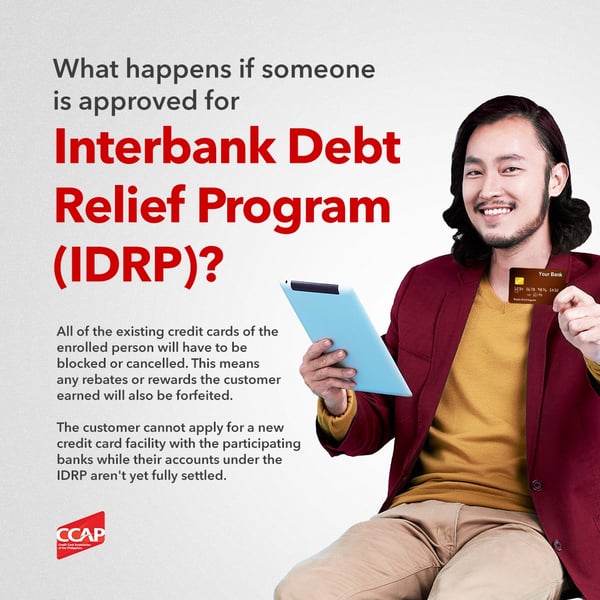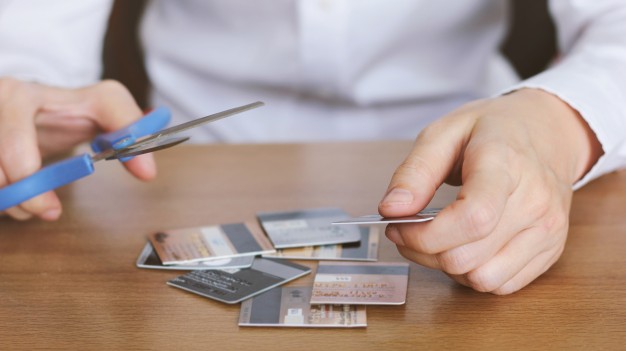Dead-worried about old credit card debts you haven't paid off? Stop stressing out and start dealing with them by availing of the credit card amnesty program in the Philippines.
This debt settlement program allows delinquent credit cardholders with unpaid credit card debt in the Philippines to pay off their outstanding balance at lower interest rates and longer repayment terms. You can then get back on track with your finances and improve your credit standing.
Some banks like HSBC have their own amnesty program for credit card debt. There's also a credit card amnesty program in the Philippines that consolidates cardholders' debts from different banks.
What Will Happen If You Don't Pay Your Credit Card Debt in the Philippines?

Wondering what happens to unpaid credit card debt in the Philippines? Here's what happens if you fail to settle your credit card balance:
- The bank will give you a written notice to remind you of your unpaid credit card balance.
- The bank will turn over your overdue credit card account to a third-party collection agency. You'll get calls from a collection agent to convince you to repay your debt.
- Your unpaid credit card debt will hurt your credit score if your balance has exceeded 90 days past the due date. This will negatively affect your chances of loan and credit card approval in the future.
Read more: What Happens If You Pay Only the Minimum on Your Credit Card
👉 Can You Be Jailed for Credit Card Debt in the Philippines?
Under the Philippine law, failing to pay credit card debt in the Philippines won't land you in jail. Unsettled credit card debts are regarded only as a civil and not a criminal offense. Article III Section 20 of the Philippine Constitution states that "no person shall be imprisoned for debt."
So if you keep getting calls from credit card agents threatening to put you in jail, don't panic and go into hiding. There are laws that protect your rights as a consumer. Furthermore, debt collection agencies are prohibited from resorting to unfair treatment and cruel actions.
However, a credit card debt lawsuit in the Philippines is possible if the fraudulent use of credit cards occurred. This can be subject to criminal prosecution with a corresponding jail term.
👉 How to Deal with Credit Card Debt Collectors in the Philippines
According to the Credit Card Association of the Philippines (CCAP), debt collectors aren't supposed to threaten you, your reputation, or your property.[1] However, a lot of them do so via text, call, or email just to get cardholders riled up, scared, or panicked enough to pay.
Under Bangko Sentral ng Pilipinas (BSP) Circular 454 Section 7, banks, credit card companies (subsidiaries or affiliates), collection agencies, counsels, and agents are prohibited from the following when collecting payments for unpaid credit cards in the Philippines:
- Threaten a person, their reputation, or their property with violence
- Use insults or obscene language
- Disclose the names of delinquent credit cardholders publicly for alleged non-payment of debts
- Threaten to take actions that cannot be legally taken
- Give false credit information and not communicate debt disputes
- Use false representation or deceptive means to acquire credit cardholders' information or get them to pay their debts
- Call the credit cardholder during unreasonable hours of the day (past 10 p.m. or before 6 a.m.) unless payment is more than 60 days past due
Should a debt collector do any of these things to you, make sure to get their consent to record all your phone calls and document your email and text exchanges.
Report unfair debt collection practices to your bank. This way, it can do something about its collection agencies’ unethical collection methods or rules of engagement.
Also, check if the collector represents an authorized agency. Visit the CCAP website for the list of accredited debt collection agencies in the Philippines.[2]
What is the Credit Card Amnesty Program?

The BSP and CCAP member-banks have a debt restructuring program called the Interbank Debt Relief Program (IDRP) to help delinquent credit cardholders in the Philippines settle their overdue accounts.
The IDRP is a repayment plan that consolidates and restructures your credit card debts. This credit card amnesty program in the Philippines offers more affordable monthly amortizations with lower interest rates.
A debtor can enjoy the same interest rates (maximum of 1.5%) for all credit card accounts and a longer repayment term (as long as 10 years). It's a more manageable way to pay off all your credit card debts. Most importantly, it will not negatively affect your credit history.
To settle credit card debts in the Philippines, you can apply for this amnesty program. If your bank's a participant in this amnesty program, submit all the required documents and wait for approval.
Watch the quick overview of what the IDRP is and how it works in this video:
👉 Restructured Credit Card Debt Features
- Low-interest rates ranging from 0% to 1.5%
- Long repayment terms ranging from 12 to 16 months (extended up to 10 years for extreme cases of credit card debt)
- Same interest rates and repayment terms applied to all unpaid credit card accounts
👉 Banks That Provide Credit Card Amnesty in the Philippines
Here are some banks that allow credit card debt restructuring under the IDRP:
- AUB
- Bank of Commerce
- BPI
- Equicom Savings Bank
- HSBC
- LANDBANK
- Maybank
- Metrobank
- PNB
- PSBank
- RCBC
- Security Bank
- UnionBank
Who Can Apply for Credit Card Amnesty?

Not all credit cardholders in the Philippines qualify for credit card debt restructuring. The IDRP is open only to those who meet its strict requirements.
👉 IDRP Eligibility Requirements
- Filipino credit cardholders only
- Must have at least one credit card from two of the participating banks
- Unpaid credit card accounts must have existed for at least six months with at least ₱10,000 outstanding balance per card and a total overdue balance of at least ₱100,000
- Applicant's age plus the repayment term of the restructured credit card accounts shouldn't exceed 65 years
- A co-maker or guarantor is required if the applicant exceeds the 65 combined age limit, has no income source, or earns insufficient income to cover the monthly amortization
- Must have no IDRP application filed in the past six months
- Must have no history of irresponsible use, misuse, or abuse of credit cards, such as purchases related to gambling, luxury, or extensive travel
How to Settle Your Debt Through Credit Card Amnesty in the Philippines
To settle your debt, you can either avail of the IDRP's or your own bank's credit card restructuring program.
👉 How to Apply for the IDRP
Call your issuing bank to apply for credit card debt restructuring under the IDRP. If you have multiple credit cards from different banks, the credit card provider with the highest combined outstanding balance will take the lead in processing your credit card amnesty application. A representative from the lead bank will call you regarding the arrangements and application process.
So if you wish to avail of the BPI or Metrobank credit card amnesty program in 2023, for example, just call the bank's customer service hotline or collections department to negotiate your credit card debt and discuss a suitable payment plan.
Banks in the Philippines are generally open to credit card debt restructuring negotiations with their delinquent customers. You just need to provide proof that you can repay your unsettled balance in installments over a longer period, which typically ranges from 12 to 60 months.
Submit these documents when applying for credit card amnesty:
- Accomplished application form
- Valid government ID of the applicant and co-maker (if required)
- Statement of income and expenses
- Proof of income
- For employed applicants: Payslips for the last three months or income tax return (ITR)
- For self-employed applicants: Latest ITR or audited financial statement
- Proof of other sources of income
- IDRP Payment Agreement Contract signed by the applicant and co-maker (if applicable)
- Debtor's consent form, promissory note, or post-dated checks
When applying for credit card amnesty under the IDRP, you must declare all your outstanding credit card balances. You can't apply only for a specific credit card account. If your application for credit card amnesty is denied, you can apply again after six months.
Alternatively, you may contact your credit card issuer to inquire about its bank-specific credit card amnesty program for delinquent accounts.
👉 How to Apply for the HSBC Philippines Credit Card Amnesty Program
Through its own Payment Plan, HSBC helps credit cardholders manage their payments. Cardholders struggling with payments are advised to contact HSBC as soon as possible to apply for a payment plan.
Here's what you need to do:
- Download the Payment Plan Application Form[3] and fill it out accordingly.
- Email it to collections@hsbc.com.ph. An HSBC representative will get in touch with you to discuss payment options and work out a payment plan.
- You may also call the Credit Control Service - Collections Department at +632 8858 5000 from 8:30 a.m. to 5:30 p.m., Monday to Friday.
If you're having trouble dealing with credit card debt, you can also apply for a credit card balance transfer. Here are some of your best options:
| Credit Card | Balance Transfer Features |
|
UnionBank Platinum Mastercard
|
|
|
Metrobank Titanium Mastercard®
|
|
|
HSBC Red Mastercard
|
|
|
Security Bank Gold Mastercard
|
|
|
BPI Edge Card
|
|
Related articles:
- Best Balance Transfer Credit Cards in the Philippines
- Say Goodbye to Late Payments―Choose from These Credit Card Payment Methods
What Happens After Getting Approved for Credit Card Amnesty?

When you get approved for credit card amnesty, you can pay your monthly amortization directly to the issuing bank or any other accredited bank or payment center.
Moreover, expect these things to happen:
- You'll lose all access to your existing credit card accounts—overdue or not. Your credit card issuer will block and include them in the credit card amnesty program. According to the CCAP, this prevents people from making a cash advance using a credit card to pay off another card.
- The credit card issuer will also forfeit all credit card rewards, rebates, and air miles that you've earned.
- You can't apply for a new credit card or loan until you've fully repaid your credit card debt.
- Your name will be reported to the CCAP and credit bureaus and kept in their list of delinquent credit card holders in the Philippines, which lenders use for credit evaluations and decisions.
If you miss paying for two consecutive months, your credit card amnesty will be canceled and considered in default. The IDRP has a Default One, Default All policy, which means defaulting with one bank will cancel the IDRP arrangement with the other banks. When this happens, you can't apply again for IDRP.
How Many Years Does it Take Before a Credit Card Debt is Written Off in the Philippines?

What happens to unpaid credit card debt after seven years in the Philippines?
A common misconception is that unpaid credit card debts disappear after seven years. Unfortunately, records of unsettled credit card debts in the Philippines will not disappear or be written off. No matter how many years have passed, you still owe these debts to your credit card issuers.
Debt collections typically last up to seven years, which can be the reason why people think debts are removed from the bank's database after that. But just because you've stopped receiving calls or letters from agents doesn't mean your debts have been eliminated.
Debt collection agencies can still collect payments for your old debts or simply declare them as "uncollectible accounts." When that happens, you'll fall under their negative list database systems.
The best thing to do is to settle your credit card debts as soon as possible. Once you've fully paid them off, get your clearance from the bank. This will serve as proof that you have no more unpaid credit card debts.
How Can You Get a Certificate of Full Payment for Your Credit Card Debt?
Once you fully pay off your credit card debt, you can request a certificate of full payment either from the bank itself or from its authorized debt collection agency.
You'll need to submit the deposit slip or proof of payment and sign the clearance form to acknowledge receipt. Make sure to keep this certificate of clearance and save a soft copy in case your credit record is not updated accordingly. Show your full payment certificate as proof that you've already settled a particular credit card debt.
Final Thoughts
Now that you know how to settle credit card debts in the Philippines, do your best to pay them off ASAP. Although an unpaid credit card debt won't land you in jail, it will negatively affect your quality of life and financial health.
Being debt-free will give you peace of mind. As much as possible, don't neglect your monthly dues and allow your debts to balloon to an amount you can't manage.
If you fall on hard times and fail to pay off your credit cards, it's not the end of the world. You can avail of the IDRP or credit card amnesty programs of different banks in the Philippines to ease your debt repayment.
Once you're debt-free, it's time to start over and get your finances back in shape. Fix your credit score and make the right financial choices this time around. Compare credit cards, so you can find one that suits your needs and budget best.

Sources:
- [1] Payments and Collections (Credit Card Association of the Philippines)
- [2] List of Accredited Collection Agencies in the Philippines as of October 2021 (CCAP)
- [3] HSBC Payment Plan Application Form














